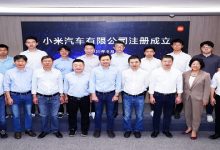During the Conference of the Parties to the United Nations Framework Convention on Climate Change (COP29), Xiaomi Corporation, a global leader in consumer electronics and smart manufacturing, unveiled its sustainability strategy centered around its foundational core technologies. The company also showcased its latest advancements in carbon management within its “Human x Car x Home” smart ecosystem, marking a significant step in its commitment to climate governance.
At the China Pavilion during the summit, Alain Lam Sai-wai, Xiaomi’s Vice President and CFO, and Chairman of Airstar Digital Technology, presented a comprehensive overview of the company’s sustainable development strategy. Lam emphasized that Xiaomi’s mission is to make AI accessible to all, advance sustainability across its ecosystem, and take responsibility for the environmental impact of its core technologies. Xiaomi’s “Human x Car x Home” smart ecosystem strategy aims to deliver a sustainable, smart lifestyle by integrating its foundational technologies and AI innovation. Lam explained, “Through smart manufacturing, AI, and new retail models in our ecosystem, Xiaomi is enhancing operational efficiency, optimizing resource utilization, and reducing energy consumption across the supply chain.”
Leveraging AI for Green Innovation
Xiaomi is integrating AI into its smart ecosystem to promote a low-carbon, efficient lifestyle. The Xiaomi HyperMind smart platform intelligently optimizes the operation of home appliances like air conditioners and refrigerators, ensuring energy efficiency through smart monitoring. This balance between comfort and environmental impact provides consumers with a smarter, more sustainable living experience.
Xiaomi’s smart manufacturing system also exemplifies sustainability, with high automation levels in critical processes. The Xiaomi EV Factory employs the Hyper Intelligent Manufacturing Platform (Hyper IMP), streamlining production from management to autonomous adjustments. This platform not only boosts production efficiency but also minimizes resource consumption at each stage of manufacturing. Additionally, the Xiaomi SU7 Series earned the “Low-Carbon Leader” award for its technological innovations that enhance energy efficiency. The car’s low drag coefficient significantly reduces energy consumption and carbon emissions, while the Xiaomi SU7 Max model supports super-fast charging, further optimizing energy use.
Carbon Management Standards for a Sustainable Future
Xiaomi also unveiled its Carbon Management System Standard for its “Human x Car x Home” ecosystem, the first of its kind to focus on carbon management for diverse enterprises in this space. This standard, established in October, aims to guide companies in efficiently managing carbon emissions and promoting sustainable development through AI-driven carbon management practices. It encourages businesses to reduce their carbon footprint across the value chain, fostering new quality productive forces that contribute to a greener, more sustainable future.
Driving ESG Innovation for Long-Term Sustainability
Building on its 2023 technology strategy, Xiaomi continues to prioritize long-term investments in fundamental technologies that will benefit humanity. Xiaomi’s commitment to environmental, social, and governance (ESG) practices is key to achieving its goals. The company aims to reduce its environmental impact through energy efficiency, clean energy adoption, and smart manufacturing innovations, all while leading the low-carbon transformation of its value chain. Xiaomi’s goal is to provide consumers with greener, smarter, and more sustainable products and services, working towards a better, low-carbon future for all.






